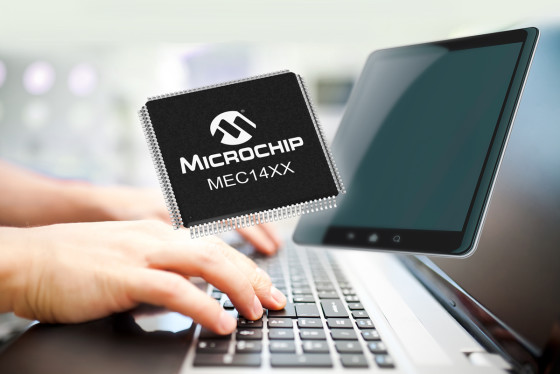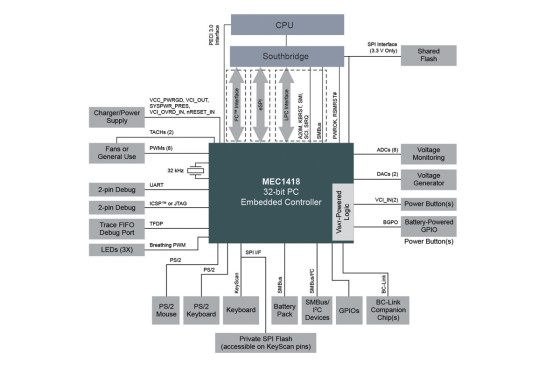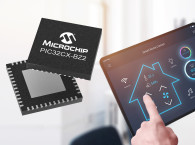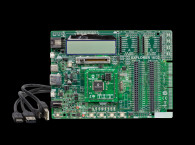Microchip Technology announced the MEC14XX family of highly configurable low-power embedded controllers customized to the needs of x86-based notebook and tablet platform designers.

The scalable family of MEC14XX devices is one of the first to support both the Intel Corporation’s new Enhanced Serial Peripheral Interface (eSPI) and the existing Low Pin Count interface (LPC). To ease the mobile computing industry’s transition to the new interface and lower-voltage designs, Microchip’s MEC14XX family also provides a flexible arrangement that allows multiple I/O signals to be configured to support either 3.3V or 1.8V, reducing the system bill-of-materials cost by eliminating the need for external voltage translators.
“Microchip’s work with Intel in development and co-validation has helped ensure that the new eSPI interface will be available on schedule in future generations of Intel platforms,” says Ahmad Zaidi VP/GM, Embedded IP Subsystems and Chipsets Group at Intel Corporation.
These features of the MEC14XX family also allow for a seamless migration of intellectual property (IP) reuse across multiple x86 computing platform architectures, such as Intel Atom, Intel iCore and AMD-based systems. This is also Microchip’s first embedded controller family targeted for general x86 computing that includes Microchip’s award-winning MPLAB development tool support.
“We have worked closely with our industry partners and our customers to stay on the forefront of defining, implementing and validating the new eSPI system interface,” explains Ian Harris, vice president of Microchip’s Computing Products Group. “The current LPC interface has served the computing market for more than 15 years, but has limitations as computing platforms continue to transition to lower voltages and as devices transition to smaller lithographies. We are proud of our contributions to the new eSPI interface, and expect it to serve the needs of the market well into the future.”
The MEC14XX devices are offered with a choice of 128 KB, 160 KB or 192 KB of closely coupled SRAM for code and data that loads from SPI-flash. Designers can leverage the host SPI-flash (used for BIOS storage) for non-volatile EC firmware storage, as a cost-effective system solution. The added choice of either the MEC140X LPC interface devices or the MEC1418, which supports both the LPC and eSPI interfaces, allows to select the most cost-effective device for a particular platform and provides manufacturers the ability to preserve their investments as the industry transitions. All members of the Microchip MEC14XX family are pin and register compatible.

Each member of the MEC14XX family is based on Microchip’s 32-bit PIC MCU architecture and is supported by Microchip’s development tools. Examples include the MPLAB XC Compilers, the MPLAB REAL ICE In-Circuit Emulator, the MPLAB ICD 3 In-Circuit Debugger and the PICkit 3 Starter Kit.
The MEC1404 (128 KB SRAM) and MEC1408 (192 KB SRAM) embedded controllers supporting the Intel LPC interface are already available for sampling and volume production, starting at $1.68 each in 10,000-unit quantities. The MEC1418 (192 KB SRAM) embedded controller, supporting both the Intel LPC and eSPI interfaces, is also available for sampling and volume production at $2.05 each, in 10,000-unit quantities. All MEC14XX devices are currently offered in a 128-VTQFP package.
www.microchip.com/MEC14XX-060115a






